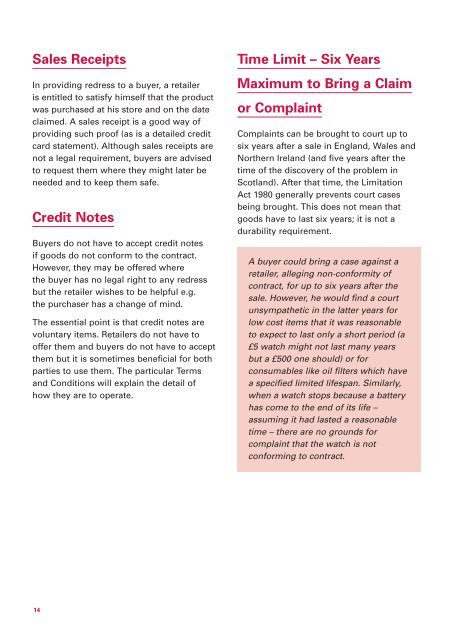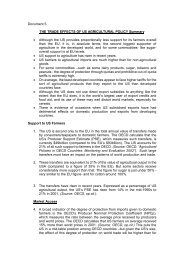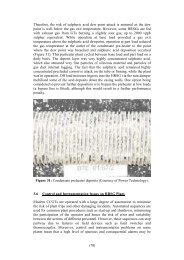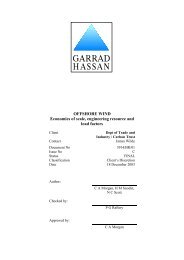A traders guide: the law relating to the - DTI Home
A traders guide: the law relating to the - DTI Home
A traders guide: the law relating to the - DTI Home
You also want an ePaper? Increase the reach of your titles
YUMPU automatically turns print PDFs into web optimized ePapers that Google loves.
Sales Receipts<br />
In providing redress <strong>to</strong> a buyer, a retailer<br />
is entitled <strong>to</strong> satisfy himself that <strong>the</strong> product<br />
was purchased at his s<strong>to</strong>re and on <strong>the</strong> date<br />
claimed. A sales receipt is a good way of<br />
providing such proof (as is a detailed credit<br />
card statement). Although sales receipts are<br />
not a legal requirement, buyers are advised<br />
<strong>to</strong> request <strong>the</strong>m where <strong>the</strong>y might later be<br />
needed and <strong>to</strong> keep <strong>the</strong>m safe.<br />
Credit Notes<br />
Buyers do not have <strong>to</strong> accept credit notes<br />
if goods do not conform <strong>to</strong> <strong>the</strong> contract.<br />
However, <strong>the</strong>y may be offered where<br />
<strong>the</strong> buyer has no legal right <strong>to</strong> any redress<br />
but <strong>the</strong> retailer wishes <strong>to</strong> be helpful e.g.<br />
<strong>the</strong> purchaser has a change of mind.<br />
The essential point is that credit notes are<br />
voluntary items. Retailers do not have <strong>to</strong><br />
offer <strong>the</strong>m and buyers do not have <strong>to</strong> accept<br />
<strong>the</strong>m but it is sometimes beneficial for both<br />
parties <strong>to</strong> use <strong>the</strong>m. The particular Terms<br />
and Conditions will explain <strong>the</strong> detail of<br />
how <strong>the</strong>y are <strong>to</strong> operate.<br />
14<br />
Time Limit – Six Years<br />
Maximum <strong>to</strong> Bring a Claim<br />
or Complaint<br />
Complaints can be brought <strong>to</strong> court up <strong>to</strong><br />
six years after a sale in England, Wales and<br />
Nor<strong>the</strong>rn Ireland (and five years after <strong>the</strong><br />
time of <strong>the</strong> discovery of <strong>the</strong> problem in<br />
Scotland). After that time, <strong>the</strong> Limitation<br />
Act 1980 generally prevents court cases<br />
being brought. This does not mean that<br />
goods have <strong>to</strong> last six years; it is not a<br />
durability requirement.<br />
A buyer could bring a case against a<br />
retailer, alleging non-conformity of<br />
contract, for up <strong>to</strong> six years after <strong>the</strong><br />
sale. However, he would find a court<br />
unsympa<strong>the</strong>tic in <strong>the</strong> latter years for<br />
low cost items that it was reasonable<br />
<strong>to</strong> expect <strong>to</strong> last only a short period (a<br />
£5 watch might not last many years<br />
but a £500 one should) or for<br />
consumables like oil filters which have<br />
a specified limited lifespan. Similarly,<br />
when a watch s<strong>to</strong>ps because a battery<br />
has come <strong>to</strong> <strong>the</strong> end of its life –<br />
assuming it had lasted a reasonable<br />
time – <strong>the</strong>re are no grounds for<br />
complaint that <strong>the</strong> watch is not<br />
conforming <strong>to</strong> contract.
















